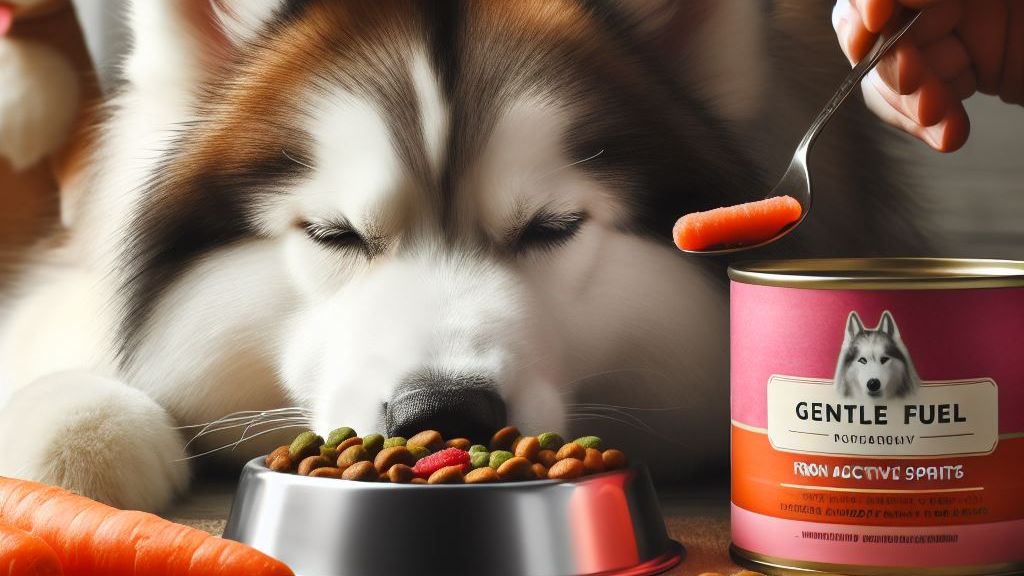If your Husky struggles with a sensitive stomach, it can be challenging to find the right food that meets their dietary requirements. This guide will help you understand your Husky’s nutritional needs, identify signs of a sensitive stomach, and provide tips on finding the best food. Keep reading to learn more about the recommended ingredients, homemade food options, feeding schedules, and switching to a new diet.
Understanding the Nutritional Needs of Huskies

Huskies are unique in their dietary requirements. These beautiful dogs have a high energy level and need a balanced diet that provides them with a sufficient amount of nutrients, proteins, and carbohydrates. They require a specific amount of fat to stay healthy and maintain their active lifestyle. Fatty acids, such as omega-3s, help keep their coat shiny and healthy.
Huskies with digestive issues or food allergies require specific nutrition to help alleviate these problems. A diet that is easy to digest and free of known allergens can help alleviate stomach problems. It is essential to understand the necessary nutrition needed to maintain your husky’s dietary requirements.
Here are some of the recommended ingredients to look for in dog food for sensitive stomachs:
- High-Quality Protein: Protein is essential for maintaining muscle mass and energy levels in huskies. Look for protein sources such as chicken, lamb, and fish.
- Grain-Free: Grain-free dog foods can help alleviate stomach problems in huskies with grain allergies.
- Limited Ingredient: Dog food with limited ingredients is often hypoallergenic and can be a great option for huskies with sensitive stomachs.
- Omega-3 Fatty Acids: Omega-3s can help keep your husky’s coat healthy and shiny, and can also aid in reducing inflammation.
- Glucosamine and Chondroitin: Huskies are prone to joint issues, and glucosamine and chondroitin can help maintain healthy joints.
- Natural Ingredients: Whenever possible, look for dog food made with natural, whole-food ingredients.
- Wet Food: Wet food can be easier to digest for huskies with sensitive stomachs.
- Dry Food: Some huskies may prefer dry food, which can also be a good option for sensitive stomachs as long as it is easy to digest.
When trying to find the best dog food for huskies with sensitive stomachs, it is crucial to consider the ingredients carefully. Speak to your veterinarian, read dog food reviews, and research reputable brands to find the best option for your husky.
Homemade dog food for huskies with sensitive stomachs is another option. However, it is important to ensure that they receive a balanced diet that provides them with all the necessary nutrients.
It is essential to establish a feeding schedule and portion control for dogs with sensitive stomachs. Overfeeding can cause digestive problems in huskies. Make sure to measure the portions and avoid giving too many treats.
When switching your husky to a new diet, do it gradually to avoid stomach problems. Start with small amounts of the new food and gradually increase the amount while reducing the old food.
In conclusion, understanding the nutritional needs of Huskies, identifying sensitive stomachs, and finding the best dog food for huskies with sensitive stomachs is essential. Ensure that your husky receives a balanced diet that meets their dietary requirements and helps alleviate any digestive issues or food allergies.

Identifying Sensitive Stomachs in Huskies
Huskies are known for their high levels of energy and activity, which is why it’s important to ensure that they are receiving the proper nutrition to fuel a healthy lifestyle. However, some Huskies may suffer from digestive issues and food allergies, making it challenging for them to find the best food that meets their dietary requirements.
Sensitive stomachs in Huskies can manifest in different ways, such as vomiting, diarrhea, constipation, and flatulence. These symptoms can be caused by various factors, including diet, eating habits, underlying health conditions, and stress. If your Husky is experiencing any of these symptoms, it’s essential to consult with a veterinarian to rule out any underlying health issues.
One of the most common causes of digestive issues in Huskies is low-quality food that contains ingredients that are hard to digest. Some Huskies may also be allergic to certain types of food, such as grains, preservatives, and artificial flavors. If your Husky is allergic to a particular type of food, it’s essential to switch to a diet that is free from those allergens.
Additionally, Huskies may also suffer from joint health issues, such as hip dysplasia, which can be exacerbated by certain types of food. That’s why it’s important to choose dog food that is rich in omega-3 fatty acids, glucosamine, and chondroitin, which promote joint health and mobility.
In order to identify if your Husky has a sensitive stomach, it’s essential to monitor their behavior after meals. If they exhibit any signs of discomfort, it may be an indication that they are having trouble digesting their food. Additionally, you may want to try a limited ingredient or grain-free diet to see if it improves their symptoms.
Overall, identifying a sensitive stomach in Huskies is a crucial step in providing them with the proper nutrition and a balanced diet. By understanding the signs and causes of digestive issues, dog owners can make informed decisions when selecting the best dog food for their Huskies with sensitive stomachs.
Finding the Best Dog Food for Huskies with Sensitive Stomachs

Huskies are known for their independent and energetic nature, making them a popular breed among pet owners. However, with their active lifestyle comes a greater need for proper nutrition. For huskies with sensitive stomachs, finding the right dog food can be a daunting task. Here are some tips on how to find the best dog food for huskies with sensitive stomachs:
- Look for Limited Ingredient Dog Food Huskies with sensitive stomachs require dog food that is easily digestible and contains a limited number of ingredients. Limited ingredient dog food contains a smaller set of ingredients that are less likely to trigger food allergies or digestive issues in huskies.
- Opt for Grain-Free Dog Food Grains can cause digestive issues and allergies in huskies with sensitive stomachs. Grain-free dog food options are formulated with alternative sources of carbohydrates such as potatoes or peas, making them a better choice for huskies with grain sensitivities.
- Choose High-Quality Protein Sources Huskies require high-quality protein sources for optimal health. When choosing a dog food for huskies with sensitive stomachs, look for options that contain lean proteins such as chicken, turkey, or fish. Avoid dog food that contains low-quality protein sources such as by-products or fillers.
- Prioritize Omega-3 Fatty Acids for Joint Health Huskies are known for their high energy levels, which means they are susceptible to joint problems. Omega-3 fatty acids are essential for maintaining joint health and reducing inflammation. Look for dog food that contains omega-3 fatty acids from sources such as fish oil or flaxseed.
- Consider Glucosamine and Chondroitin for Joint Health Glucosamine and chondroitin are natural compounds that support joint health and reduce inflammation. They are commonly found in dog food formulated for joint health. If your husky has joint problems, look for dog food that contains these compounds.
- Look for Natural Ingredients Huskies with sensitive stomachs are often intolerant to artificial additives and preservatives. Look for dog food that contains natural and whole food ingredients. These options will be easier to digest and provide better nutrition for your husky.
- Consider Wet Food for Digestive Issues Wet dog food can be easier to digest for huskies with sensitive stomachs. That’s because wet dog food contains more moisture than dry dog food, helping to prevent digestive issues. Wet dog food can also be a great option for huskies who are picky eaters.
Finding the best dog food for your husky with a sensitive stomach is a process of trial and error. However, by prioritizing high-quality protein sources, limited ingredients, and natural ingredients, you can provide your husky with a balanced diet that meets their dietary requirements. Be sure to consult with your veterinarian if you have any questions about your husky’s nutritional needs.
Recommended Ingredients for Dog Food for Sensitive Stomachs
When it comes to feeding your husky with a sensitive stomach, it’s important to choose dog food that’s gentle on their digestive system. This means looking for high-quality protein sources, limited ingredients, and avoiding common allergens such as grains and artificial additives.
One of the key components of good dog food for sensitive stomachs is high-quality protein. Look for dog food that contains real meat like chicken, turkey, or beef, as this will provide your husky with the energy they need to maintain their active lifestyle. However, be aware that certain dogs may also have sensitivities or allergies to specific types of protein, so it’s always a good idea to consult with your vet before making a final decision.
Another important ingredient to look for is healthy fats, such as omega-3 fatty acids. This can come from sources such as salmon or fish oil, and can provide a range of health benefits including improved skin and coat health, as well as reduced inflammation. In addition to healthy fats, look for dog food that contains joint-supporting ingredients such as glucosamine and chondroitin, which can be especially important for huskies who are prone to joint issues.
Many veterinarians recommend a grain-free diet for dogs with sensitive stomachs, as grains can be difficult for some dogs to digest. Instead, look for dog food with limited ingredients and natural sources of fiber, such as sweet potatoes or pumpkin. Similarly, try to avoid dog food that contains added artificial ingredients, flavors, or preservatives, as these can also cause digestive issues in some dogs.
In addition to dry food, you may want to consider incorporating wet food into your husky’s diet. Wet food can be easier to digest and can help keep your dog hydrated. If you do choose to feed your dog wet food, be sure to read the ingredients carefully to ensure it’s made with natural ingredients and is free from common allergens.
Overall, the best dog food for huskies with sensitive stomachs will be one that meets all of their specific dietary requirements while still providing them with the nutrition they need to stay healthy and active. By carefully selecting high-quality ingredients, avoiding common allergens, and consulting with your vet, you can help ensure your husky has a balanced diet that supports their unique needs.

Homemade Dog Food for Sensitive Stomachs
When it comes to feeding huskies with sensitive stomachs, some pet owners may prefer to make their own dog food at home. This allows them to have complete control over the ingredients and ensure that their husky is getting the nutrition they need. Here are some recommended ingredients to include in homemade dog food for sensitive stomachs.
- High-quality protein: Protein is essential for huskies, but it’s important to choose a protein source that is easy to digest. Chicken, turkey, and fish are good options for sensitive stomachs.
- HGrain-free carbohydrates: Some huskies may have food allergies or digestive issues related to grains. Instead, use sweet potatoes, peas, or other grain-free options as a source of carbohydrates.
- Omega-3 fatty acids: Omega-3 fatty acids can help reduce inflammation in the digestive tract and promote healthy skin and coat for huskies. You can add fish oil or flaxseed oil to your homemade dog food.
- Glucosamine and chondroitin: These supplements can support joint health in huskies, which is important for their active lifestyle. You can add these supplements to your homemade dog food or choose a protein source that naturally contains them, such as salmon.
- Probiotics: Probiotics can help balance the gut flora in huskies with sensitive stomachs and promote better digestion. You can add a probiotic supplement or plain yogurt to your homemade dog food.
When making homemade dog food for sensitive stomachs, it’s important to follow a balanced recipe that meets your husky’s dietary requirements. Consult with a veterinarian or canine nutritionist to ensure you are providing your husky with the appropriate nutrition.
Feeding homemade dog food also requires more planning and preparation than feeding commercial dog food. You’ll need to make sure you have all the necessary ingredients, a balanced recipe, and enough time to prepare and store the food safely.
Overall, homemade dog food can be a great option for huskies with sensitive stomachs, but it requires careful consideration and planning to ensure your pet’s nutrition needs are met.
Feeding Schedule and Portions for Sensitive Stomachs
When it comes to feeding Huskies with sensitive stomachs, it’s essential to stick to a strict feeding schedule and portion control. Feeding your dog at the same time every day and monitoring the amount of food they consume can help prevent digestive issues.
A common mistake that dog owners make is free feeding, which involves leaving food out all day for your dog to eat whenever they please. Free feeding can lead to overeating and weight gain, which can worsen digestive issues. Instead, it’s best to feed your Husky two to three small meals a day, based on their dietary requirements.
To determine the appropriate portion size for your Husky, you should consider factors such as their age, weight, and activity level. You can also consult with your veterinarian to determine the right amount of food for your dog.
When selecting the best dog food for Huskies with sensitive stomachs, you should opt for high-quality protein sources, grain-free, and limited ingredient formulas. These typically have easily digestible ingredients, reducing the risk of digestive issues.
If you choose to give your dog wet food, you should refrigerate any unused portions after opening and dispose of them after a maximum of three days. Dry food, on the other hand, can be stored in airtight containers to maintain freshness.
It’s crucial to monitor how your Husky responds to any new food changes. If you notice any signs of digestive issues, such as vomiting or diarrhea, you should speak with your veterinarian and adjust their feeding schedule and portions accordingly.
In addition to a balanced diet, it’s recommended to include supplements such as glucosamine and chondroitin to promote joint health in Huskies, who are prone to hip dysplasia. Omega-3 fatty acids can also benefit their skin and coat health.
Overall, sticking to a feeding schedule and portion control, and choosing the right dog food and supplements can help prevent digestive issues in Huskies with sensitive stomachs. It’s essential to consult with your veterinarian and observe your dog’s response to new food changes for optimal health and well-being.
Tips for Switching Your Husky to a New Diet
When it comes to switching your husky to a new diet, it’s important to do so gradually. Abrupt changes to your dog’s diet can lead to stomach upset and gastrointestinal distress. Follow these tips to transition your husky to a new diet:
- Start Slowly – Begin by slowly introducing small amounts of the new food to your husky’s current diet. Gradually increase the new food while decreasing the old food over the course of a week or two.
- Monitor Your Husky – Keep a watchful eye on your husky during the transition period. Look out for any signs of digestive issues, including diarrhea, vomiting, or decreased appetite.
- Stick to a Schedule – Try to maintain a consistent feeding schedule, as this can help regulate your husky’s digestive system and prevent upset stomachs.
- Mix Wet and Dry Food – Mixing wet and dry food can help make the transition easier for your husky. Wet food can be more easily digested, while dry food offers dental benefits.
- Don’t Rush the Transition – Take your time with the transition; it can take several weeks to fully transition to a new food. Rushing the process can lead to digestive issues and stress for your husky.
- Consider Probiotics – Adding probiotics to your husky’s diet can help support digestive health during the transition period.
By following these tips, you can ensure a smooth transition to a new diet for your husky with a sensitive stomach. Remember, it’s important to select a high-quality, balanced diet that meets your husky’s specific dietary requirements. With the right food and a gradual transition, your husky can maintain a healthy and happy lifestyle.
Conclusion
After all the research and considerations, finding the best dog food for huskies with sensitive stomachs can be a challenging task. However, it is crucial to prioritize the dietary requirements of your furry friend to ensure they maintain optimal health and well-being.
The recommended ingredients for dog food for sensitive stomachs include high-quality protein, grain-free, limited ingredient, omega-3 fatty acids, glucosamine and chondroitin for joint health, and natural ingredients. Wet food, dry food, and hypoallergenic options are also common choices, and it is crucial to feed them a balanced diet that caters to their specific needs and requirements.
Homemade dog food can be a viable option if your husky has food allergies or digestive issues. However, it is essential to consult your vet and follow a nutritionally balanced recipe to ensure your dog is getting the necessary nutrients and vitamins.
To maintain a healthy diet for your husky, it is also important to establish a feeding schedule and portion control that works for them. Transitioning to a new diet requires gradual adjustments to avoid gastrointestinal issues, and consulting with your vet during the process is highly recommended.
Choosing the best dog food for huskies with sensitive stomachs can be overwhelming, but it is essential to prioritize their nutrition and make informed decisions. It is highly recommended to choose reputable brands that are veterinary recommended and have positive dog food reviews. If affordability is a concern, there are various affordable premium dog food options available as well.
In conclusion, taking care of your husky’s sensitive stomach ensures they remain happy and healthy while living an active lifestyle. By understanding their unique nutritional needs and requirements, you can provide them with the best diet possible, whether it’s through choosing the best dog food brands or making homemade dog food. With the right balance of nutrition, your husky can thrive and enjoy their adventurous life to the fullest.
